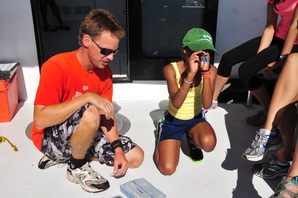Hi Gills!
We talked a bit about the science I do back in September, but I’m also the Intern Coordinator for the Shark Research and Conservation Program at the University of Miami. This means that I’m responsible for training interns to safely work with and handle sharks, as well as teaching them to give talks on shark ecology and biology. A lot of the amazing Gills scientists you’ve heard from so far have talked about the work that they do in the field or the lab, and while I love both of those things, the most important thing I do every day is help to teach and train the next generation of shark scientists—including (someday) some of you! So after a few parents contacted me with questions, I thought it might be helpful to have a talk about what you can do to help prepare for a successful career in marine science (other than studying hard). 1. Get comfortable on and in the water. If you want to do field work with marine life, you’ll need to go where they are, and that’s going to include being on boats and probably (at least sometimes) swimming and diving. I can’t tell you how many times I’ve had to jump in to unwrap a rope stuck around a boat propeller; being comfortable in the water makes everything else easier. You don’t have to live near the ocean—practicing swimming in a pool or lake will help too! 2. Get some experience! Lots of aquariums or scientific programs need volunteers to help with tasks (our program wouldn’t run without our 25+ amazing UM intern volunteers). Be willing to do anything when you’re starting out. A lot of the work we do involves chopping bait into pieces, cleaning or preparing gear, and other stuff that might seem gross or boring. Doing whatever needs to be done without complaint will set you apart and really show your work ethic—which usually leads to more opportunities. 3. Be detail oriented and good at listening to instructions. You can get better at this if you aren’t naturally great at it by practicing the skills you’ll need (like tying knots) and by making lists. When I select interns, I look for students who I think I can trust to listen to me and do what I tell them even in confusing or intense situations. There really is a big difference in field work between doing something kind of right and doing it exactly right. And if you aren’t sure what to do, ask! It’s much better to check in and get it right than do it wrong. 4. Be polite, but persistent. I used to be really shy, and it wasn’t until I started getting hundreds of emails from prospective interns that I realized that if someone doesn’t respond to you, they may not be ignoring you…it may just be that your email or phone call was accidentally forgotten. Sometimes I get really behind on responding to people, especially if I’ve been in the field a lot. It’s not because I don’t care! Always, always communicate in a way that is polite and professional, but if you don’t hear back, send a follow-up email. 5. Learn how to be part of a team. Even if you don’t like sports, join the science or debate team, or a marine science club. Practice working and cooperating with other students, even those who aren’t your favorite people. When choosing new interns, I don’t only think about their qualifications, but about how they will fit into and get along with our existing team. I try to avoid hiring interns who don’t work well with others. These are skills you can start building at any age that will help you throughout your career—even if it isn’t in marine science. If you have questions for me or you’re interested in having one of our outreach interns Skype with your class, you can also ask your teacher to contact me via Facebook or at cmacdonald (at) inbox.com to set that up.
0 Comments
Leave a Reply. |
Field Notes
Archives
July 2021
Categories |
|
Partner with us! We are always looking for new schools, scientists, and non-profit organizations to partner with. Please contact us here to start a conversation.
Hear from us! Sign up for our newsletter to hear about what is happening at Field School as well as upcoming offers and specials. |


 RSS Feed
RSS Feed